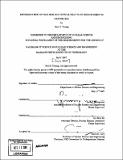Determination of pool boiling Critical Heat Flux enhancement in nanofluids
Author(s)
Truong, Bao H. (Bao Hoai)
DownloadFull printable version (3.049Mb)
Alternative title
Determination of pool boiling CHF enhancement in nanofluids
Other Contributors
Massachusetts Institute of Technology. Dept. of Nuclear Science and Engineering.
Advisor
Jacopo Buongiorno and Lin-Wen Hu.
Terms of use
Metadata
Show full item recordAbstract
Nanofluids are engineered colloids composed of nano-size particles dispersed in common fluids such as water or refrigerants. Using an electrically controlled wire heater, pool boiling Critical Heat Flux (CHF) of Alumina and Silica water-based nanofluids of concentration less than or equal to 0.1 percent by volume were measured. Silica nanofluids showed CHF enhancement up to 68% and there seems to be a monotonic relationship between nanoparticle concentration and magnitude of enhancement. Alumina nanofluids had CHF enhancement up to 56% but the peak occurred at the intermediate concentration. The boiling curves in nanofluid were found to shift to the left of that of water and correspond to higher nucleate boiling heat transfer coefficients in the two-phase flow regime. SEM images show a porous coating layer of nanoparticles on wires subjected to nanofluid CHF tests. These coating layers change the morphology of the heater's surface, and are responsible for the CHF enhancement. The thickness of the coating was estimated using SEM and was found ranging from 3.0 to 6.0 micrometers for Alumina, and 3.0 to 15.0 micrometers for Silica. Inductively Coupled Plasma Spectroscopy (ICP-OES) analyses were also attempted to quantify the mass of the particle deposition but the results were inconsistent with the estimates from the SEM measurement.
Description
Thesis (S.B.)--Massachusetts Institute of Technology, Dept. of Nuclear Science and Engineering, June 2007. "May 2007." Includes bibliographical references (leaves 51-53).
Date issued
2007Department
Massachusetts Institute of Technology. Department of Nuclear Science and EngineeringPublisher
Massachusetts Institute of Technology
Keywords
Nuclear Science and Engineering.